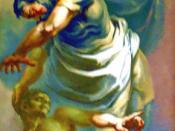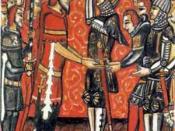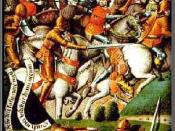"Happily ever after, Arrived for everyone involved.
Our hero loves our Heroine.
And everyone has evolved.
The "Bad Guy" has been killed, By our gallant knight, Who rode up on his great white horse, And gave that man a fright.
The Heroine, (our Princess) Married her true love.
Her father gave his blessing, And they married under doves.
And so they live together, In the castle on the hill.
King and queen they are now, Their dreams have been fulfilled." --Steffie Davis [Happily Ever After (Poetic Epilogue)] For all its serious matter, the Song of Roland may be related to a fairy tale. The ideals of medieval France as seen in the said epic poem may also be perceived in the typical storyline between the words, "Once upon a time... and they lived happily ever after." In the selection above, it is mentioned that "the 'Bad Guy' has been killed."
This line echoes a medieval French idea of absolute good versus absolute evil, pure and simple. In the Song of Roland, there is no gray area between these two extremes-a person was either one or the other. The horrors of war were not intensified by ambiguous moral justifications, as in Homer's Iliad, nor are heroes deterred by compassion for the enemy, as in the Mahabharata. War is great, even glamorous. The cost is heavy, but only for the heroes. Villains deserve neither compassion nor grief. The Franks represent pure Good; they are moved by the will of God. The Saracens are evil, and on dying their souls are dragged down to hell by devils. Just like the Crusades, the war in The Song of Roland is seen as a holy mission.
The "gallant knight...on his great white horse" exemplifies chivalry-the combination of qualities expected of the ideal medieval knight,


